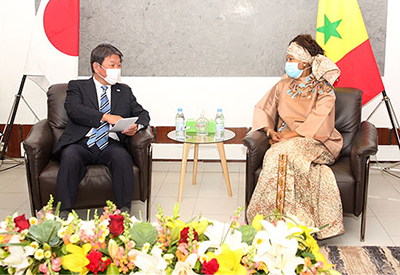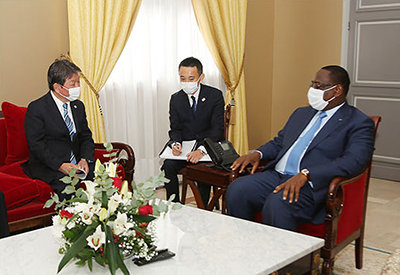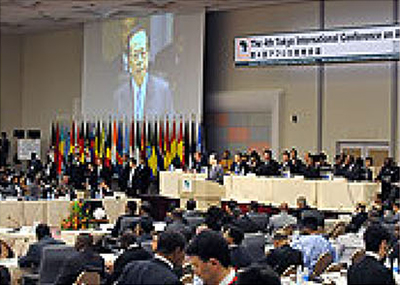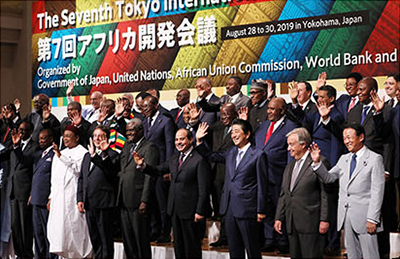Diplomatic Bluebook 2022
Chapter 2
Japan's Foreign Policy by Region
5 West Africa
(1) Ghana
The Akufo-Addo administration (New Patriotic Party (NPP)) that took office in 2017 and was re-elected for the second term from 2021, has adopted the concept of Ghana Beyond Aid, and is working to attract investment and diversify industries. Since the spread of COVID-19, the government has been focusing on counter measures against the virus and on rebuilding the domestic economy.
Japan has supported the Noguchi Memorial Institute for Medical Research for many years through ODA. The institute is a symbol of friendship between the two countries and has been responsible for about 80% of the country's PCR tests at its peak and has played a central role as a center for measures against COVID-19. Dr. Noguchi Hideyo's hometown of Inawashiro, in Fukushima Prefecture, was the host town for Ghana during the Tokyo 2020 Games.
(2) Cabo Verde
Cabo Verde has a well-established democracy with relatively high political stability among African countries. With the expiration of the term of office of former President Jorge Carlos Fonseca, a peaceful presidential election was held in October, and Jose Maria Neves became president.
Japan has contributed to the development of Cabo Verde for many years through ODA. In 2021, it supported the country's efforts to reduce inequality and create sustainable economic development through food aid and the provision of medical and fishery-related equipment.
(3) Guinea
In Guinea, in September, a group of soldiers detained President Alpha Condé by force. Subsequently, Colonel Mamady Doumbouya became the interim president, and under the transition charter, a transition system is being put in place, including the appointment of ministers of the transitional government.
Guinea has abundant water resources and fertile land, has high development potential for agriculture and fisheries, along with the largest mineral resources in West Africa that produce bauxite and iron. Japan has had a friendly cooperative relationship with Guinea for many years.
(4) Côte d'Ivoire
Under President Alassane Ouattara's stable administration of more than 10 years, during which he was re-elected at the end of 2020, Côte d'Ivoire has achieved steady economic development with its increasing presence as a distribution hub in West Africa centered on the port of Abidjan. In June, former President Laurent Gbagbo returned to Côte d'Ivoire after being acquitted by the International Criminal Court, and further domestic reconciliation and dialogue is expected.
Japan is supporting the sustainable social stability of Côte d'Ivoire and promoting economic and social development through infrastructure development and pursuing a good health society. In addition to favorable bilateral relations, the Japan-Côte d'Ivoire Investment Agreement came into effect in March 2021, and it is expected that economic relations will become even closer at the private level.
(5) Senegal
Against the backdrop of domestic political stability, President Macky Sall has pursued active diplomacy even during COVID-19 epidemic and has been actively involved in the issue of peace and stability in the region through the Economic Community of West African States (ECOWAS). He also hosted the Forum on China–Africa Cooperation (FOCAC) in November and the Dakar International Forum on Peace and Security in Africa in December, demonstrating his presence in the international community.
In January, Foreign Minister Motegi visited Senegal and paid a courtesy call to President Sall and two two-day foreign ministerial talks with Minster of Foreign Affairs and Senegalese Abroad Aïssata Tall Sall. Through this visit, Foreign Minister Motegi affirmed that Japan will further strengthen its multi-layered cooperative relationship with Senegal, including cooperation in tackling international issues, based on the friendly relationship with Senegal, with which Japan celebrated the 60th anniversary of the establishment of diplomatic relations in 2020. In the Dakar International Forum in December, State Minister for Foreign Affairs Suzuki Takako participated by sending a video message, touching on Japan's efforts to support Africa's peace and stability, while appealing for the strengthening of international cooperation to help Africa building back better from COVID-19 pandemic.
 Japan-Senegal Foreign Ministers' Meeting
Japan-Senegal Foreign Ministers' Meeting(January 11, Dakar, Senegal)
 Courtesy call to President Sall of Senegal by Minister Motegi
Courtesy call to President Sall of Senegal by Minister Motegi(January 11, Dakar, Senegal)
(6) Nigeria
President Muhammadu Buhari, who started his second term in 2019, continues to prioritize the economic, security and anti-corruption measures he has been working on to take Nigeria to the “next stage.” On the security front, following the report that the leaders of Boko Haram and Islamic State (IS) West Africa (ISWAP), which had been engaged in terrorist activities in the northeast, died in May and October, respectively, it is said that the number of armed groups, including their families, surrendered one after another, reaching a total of 17,000 people in November.
Forty-seven Japanese companies have set up operations in Nigeria. Japan and Nigeria are deepening exchanges in various fields, including economic relations. In December, Japan and Nigeria exchanged notes concerning grant aid of 300 million Japanese yen for road maintenance-related equipment (“The Economic and Social Development Programme”).
(7) Niger
Mohamed Bazoum assumed office as president in April after a peaceful presidential election. Buttressed by the establishment of democracy, Niger is striving to tackle development issues and counterterrorism and violent extremism. It also actively contributes to the international peace and security, especially the Sahel region, for instance by hosting a high-level open debate on climate change and international peace and security as the UN Security Council President for December.
Japan has been supporting the promotion of Niger's sustainable development through improving education and agricultural and rural development. In October, Japan provided grant aid of 400 million Japanese yen for food aid and is working on cooperation to improve food security.
(8) Burkina Faso
Under President Roch Marc Christian Kaboré, who was re-elected at the end of 2020, Burkina Faso has continued to work on development issues, such as formulating its next five-year strategy, “National Plan for Economic and Social Development (PNDES II).” However, there has been growing dissatisfaction with counter-terrorism measures as terrorist acts have occurred in various places, and in January 2022, a group of soldiers of the armed forces detained the president and others and seized power. While Burkina Faso has been suspended from participating in ECOWAS and the AU, prompt return to a constitution-based order is expected.
(9) Benin
A presidential election was held in Benin in April, and President Patrice Talon, who had been promoting various reforms including infrastructure development and anti-corruption measures since taking office, was re-elected.
Japan has been providing economic cooperation focusing on infrastructure development, industrial promotion and improving the people's livelihoods. The Hospital Allada, which was constructed with the support of Japan, also plays an important role as a hub to fight COVID-19.
(10) Mali
Since the armed uprising by a group of Malian army soldiers in August 2020 followed by the resignation of President Ibrahim Keita, the provisional government led by interim President Bah Ndaw had been preparing to hold presidential and national parliamentary elections by February 2022. In May 2021, a group of Malian army soldiers detained officials of the provisional government, and the political situation once again became unstable. Under the new interim President Assimi Goita, although he is working toward the restoration of constitutional order and the transition to civilian rule, the transfer to civilian rule is stalled as the provisional government hopes that the election will be postponed significantly because the restoration of security is the highest priority.
The peace and stability of Mali are also essential for the prosperity of the Sahel region, and Japan intends to support Mali's efforts toward the early restoration of constitutional order and the transition to civilian rule, in cooperation with the international community. In December, Japan made the decision to provide the equipment necessary for conducting elections through the UNDP for the early implementation of transparent and reliable elections.
(11) Mauritania
Mauritania continues to have a stable government under President Mohamed Ould Cheikh El Ghazouani, who took office in August 2019, as he reaches a turning point in his term. On the economic front, Mauritania's economy is based on exporting abundant marine, mineral, and energy resources. In particular about 30% of its octopus exports are for Japan.
Japan has friendly relations with Mauritania. In 2021, the Mauritania parliament created the Mauritania-Japan Friendship Parliamentary Group. Japan is supporting Mauritania in its efforts toward food security through food aid, in addition to support for capacity building in fisheries.
The year 2023 marks the 30th anniversary since Japan launched the Tokyo International Conference on African Development (TICAD) in 1993. Looking ahead to the Eighth Tokyo International Conference on African Development (TICAD 8) in August this year, we look back on the history of TICAD.
TICAD is an international conference launched by Japan in 1993 with the aim of reviving interests within the international community in supporting Africa and advocating the importance of extending assistance to the region, against the backdrop of such interests waning after the end of the Cold War. As a forum on African development, this conference is a pioneering initiative in the international community. The first conference (TICAD I) emphasized the importance of harnessing the successful experience of Asia's economic growth for the benefit of African development.
TICAD II (the second TICAD) was held in 1998 based on the theme of “Poverty Reduction and Integration into the Global Economy.” At this conference, “ownership” of Africa and “partnership” of the international community were also advocated as underlying principles of TICAD. These principles reflect the application of Japan's post-war experience to African development, as Japan itself had developed with the support of the international community while retaining its autonomy after World War Ⅱ. Today, these principles of “ownership” and “partnership” are shared globally and are inspiring African countries.
TICAD III (the third TICAD) was held in 2003 amidst the strengthening of ownership among the African countries towards promoting development. For example, the New Partnership for Africa's Development (NEPAD) was established in 2001, and the African Union (AU) was established in 2002. Under the recognition that “there will be no stability and prosperity in the world in the 21st Century unless the problems of Africa are resolved,” Japan has engaged in discussions with a view to bringing together the knowledge and experiences of the international community to provide support for Africa.
 At TICAD IV (May 28, 2008, Yokohama)
At TICAD IV (May 28, 2008, Yokohama)TICAD IV (the fourth TICAD) was held in 2008 under the theme “Towards a Vibrant Africa: a Continent of Hope and Opportunity.” At this conference, discussions were focused on the priority matters of boosting economic growth, ensuring human security, and addressing environmental issues and climate change. Japan announced its intention to double its ODA and private investment in Africa, and affirmed the importance of the TICAD follow-up mechanism, which has remained as one of the features of TICAD till the present day.
TICAD V (the fifth TICAD) was held in 2013 on the theme “Hand in Hand with a More Dynamic Africa,” and discussions were held on further boosting Africa's economic growth. In light of the importance of human resource development for industries in Africa, the “African Business Education Initiative for Youth” (“ABE Initiative”)(Note) was announced at this conference.
TICAD VI (the sixth TICAD) was held in Kenya in 2016 as the first TICAD conference held in Africa. At this conference, Japan announced that it would invest in Africa's future through measures such as developing quality infrastructure, promoting resilient health systems, and building a foundation for peace and stability, amounting to approximately 30 billion US dollars under public-private partnership.
 Group photograph at TICAD 7 (August 28, 2019, Tokyo. Photo: Cabinet Public Relations Office)
Group photograph at TICAD 7 (August 28, 2019, Tokyo. Photo: Cabinet Public Relations Office)TICAD 7 was held in 2019 under the theme “Advancing Africa's development through people, technology and innovation.” Discussions were held at this conference based on the three pillars of economy, society, and peace and stability. The promotion of business was the main focus of discussions, and the conference served as an opportunity to affirm the importance of promoting more private investment in Africa than ever before. The number of Japanese companies entering the African market has almost doubled over the past decade, from 520 to 910 companies.
Since the launch of TICAD, Japan has worked actively on enhancing the international community's interest in African development. Today, Africa's potential as the “final frontier of the 21st century” is attracting an unprecedented level of attention from the international community. It is also important for Japan to further deepen its cooperative relationship with Africa through the TICAD process.
As COVID-19 has shed light on various development challenges faced by Africa, Japan aims to strongly support Africa-led development and set out a pathway for African development through TICAD 8, looking ahead to the post-COVID-19 era.
- Note African Business Education Initiative for Youth (ABE Initiative): A program that invites African youths to Japan and provides them with opportunities to study for their master's degrees in Japan and participate in internships at Japanese companies. It fulfills the important role to build a bridge between Japan and Africa

